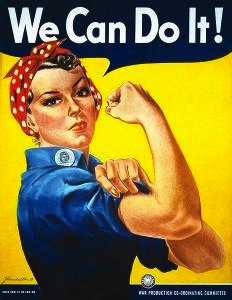By: Taryn Winston
For some March means the beginning of springtime, as the temperature climbs and vegetation begins to grow. For others, it’s the month of “madness,” as the annual college basketball tournament kicks off and gambling resumes. It’s also, of course, a month of relaxation, as college students flock to beaches across the nation for spring break.
Yet approximately a week into March, it appears many Americans have forgotten another meaning of the month worth recognizing – the celebration of Women’s History Month and the honoring of influential women and their contributions to society. Founded initially in 1981 as “Women’s History Week”, the celebration of women and their accomplishments expanded to an entire month in 1987 as a way to advocate for equality among the sexes, specifically in schools and classroom settings. The celebration of Women’s History Month has never attracted as much attention as say, Black History Month or Hispanic Heritage Month. However, these days its acknowledgment has slowly dwindled to the point that it is almost forgotten about. No commercials. No moments of reflection or remembrance. Quite a contrast from the month of February, in which Americans were consistently reminded (and rightfully so) about the contributions of great African American leaders.
Thus, this disparity begs the question of whether or not Women’s History Month is necessary or even relevant in today’s day and age. Certainly, many would argue that the initial purpose of a women’s history month- to promote equality among both the sexes in learning environments – isn’t an issue anymore. And of course, they are partially correct. When “Women’s History Week” was first founded in 1981, the fight for equal rights among men and women was still very much ongoing. While women had made significant strides in government and in society, issues such as workplace discrimination and lower wages persisted. And though we still face some of the same issues currently, the disparity is nowhere near the level it was twenty or even ten years ago.
But to argue that the sole purpose of “Women’s History Month” is simply to combat race inequality would not be sufficient. Or even accurate for that matter. To prove this point, one need not look further than the average history textbook utilized in schools across the United States. Entire sections and chapters are devoted to discussing historical white male figures such as George Washington, Abraham Lincoln, Alexander Hamilton, and so on. Increasingly African American figures such as Frederick Douglass and W.E.B Du Bois are receiving more coverage and discussion time in classrooms, and this is a positive development. Yet if we were to look for the chapters or sections discussing American women, it is more likely than not that we will fail to find any significant coverage. As educator and historian Nicholas Ferroni observed while lecturing his students, “Our textbooks do not blatantly encourage students to be racist, sexist or discriminatory, but it’s the lack of figures and truths which give students the impression that certain groups didn’t nearly have as large of a role as others and, in some cases, groups are completely nonexistent.”
Many Americans even go as far to suggest that the concept of Women’s History Month is unnecessary, particularly due to the fact that influential women are already honored and acknowledged during the celebration of other months. This, of course, is woefully inaccurate. Take Black History Month, for instance. Which African American leaders first come to our mind? Legendary male figures such as Martin Luther King, Jr., Malcolm X, and Booker T. Washington. And while many Americans are familiar with the courage and work of Rosa Parks, names such as Fannie Lou Hamer and Septima Clark are sadly not as recognizable. Take a look at Hispanic Heritage Month. Leaders such as Cesar Chavez and Dennis Chávez are fairly well-known. Yet famous Hispanic women, including Lucy Gonzalez and more recently Sonia Sotomayor, do not receive nearly the same amount of recognition.
It is for all of these reasons that Women’s History Month not only serves an important purpose, but a necessary one. It also speaks to why the recent lack of attention to Women’s History Month is alarming and saddening. It is naive to think even in today’s time women are receiving an equal amount of recognition for their contributions to American history. And this disparity, Ferroni notes, has serious consequences; when “girls learn about a predominantly male history, we are downplaying women in general and, therefore, are giving the impression that they are the weaker gender.” So as we go about the rest of the month -whether enjoying the warm weather, cheering on our favorite team, or simply laying out on the beach – we must not forget to reflect upon the women who have come before us and shaped our history and our nation.
We must not let Women’s History Month go forgotten.

